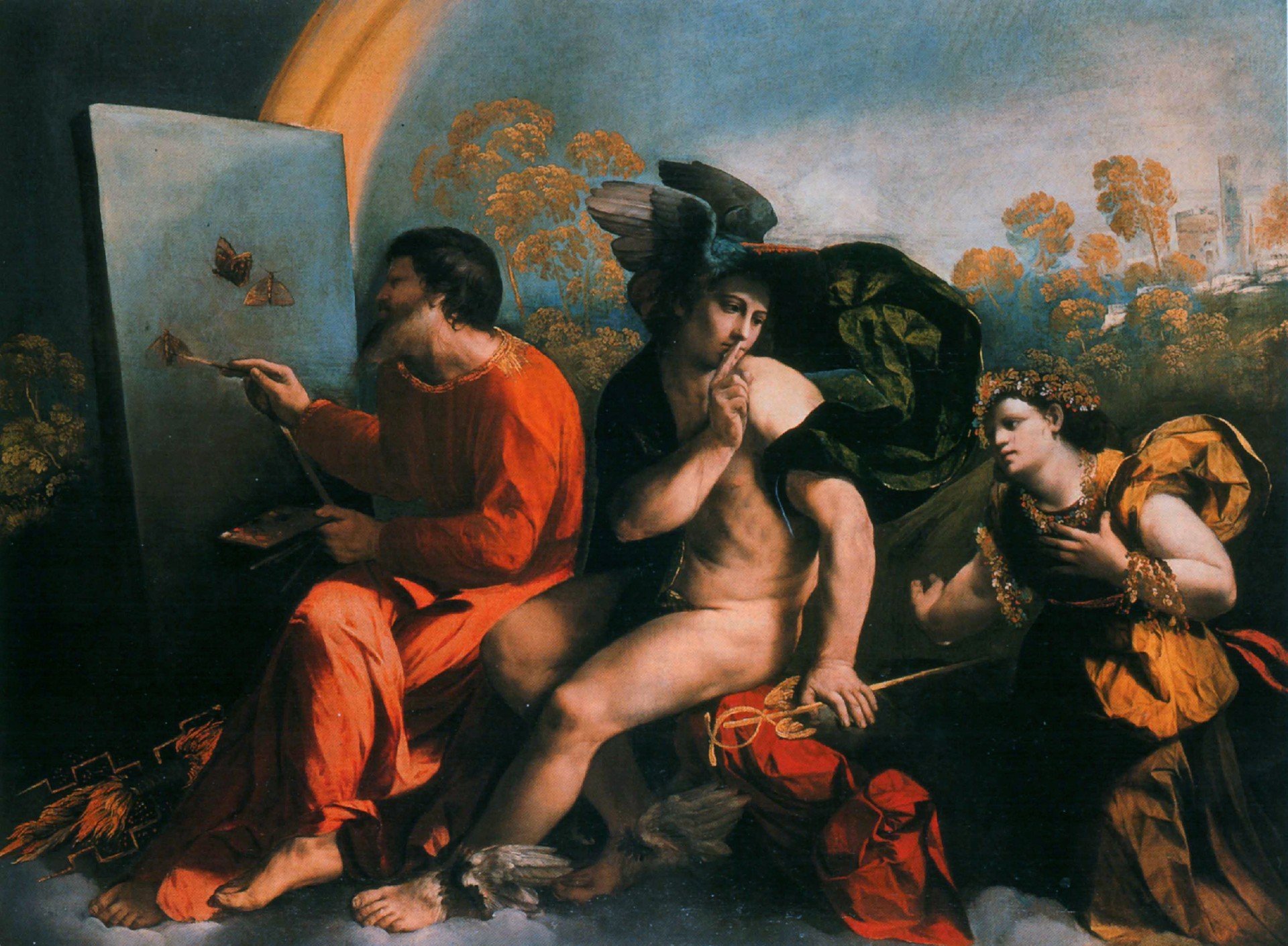If interested in a personal liturgy, please consult this portal.
Mercury has just stepped into Libra, the seventh house of the zodiac, the Descendant. He leaves behind his own exalted quarters in the mutable earth of Virgo. Called Hermes by the Greeks, Thoth by the Egyptians, and Raphael by the mystics, he shifts his emerald light into the airy balance of the scales. This transit the planet into the region known as the Atrium of the Temple of Solomon, where mutable earth of Virgo, cardinal air of Libra, and fixed water of Scorpio stand side by side. It is the space between the two columns, the equilibrium between mercy and severity, the very arch that sustains the entrance to the Holy chamber.
At this moment Mercury still bears the mark of the recent solar conjunction only five days past. His entrance into Libra comes under tension, pressed between the weight of Saturn retrograde in the last degrees of Pisces and Neptune retrograde at the first degree of Aries, both in direct opposition to him. He also draws supportive lines to the great transformers: Uranus retrograde in the first degree of Gemini – a place under Mercury’s own rulership – and Pluto retrograde in the first degree of Aquarius. The scribe of the gods is bound into a cruciform pattern with the four slow burners of heaven, each one whispering its gravity into his wings. The messenger is being caught in a vast net of oppositions and trines, carrying the signs of judgment, dissolution, revelation, and death.
Mercury assumes an even heavier charge, as he becomes the ruler of a partial solar eclipse on September 21. An eclipse is always judged through the sign in which it falls and through its planetary lord. This one unfolds right before the Autumn Equinox, at twenty-nine degrees of Virgo, the final and most critical degree, and so it lies entirely under Mercurial governance. To be lord of an eclipse means that the planet sets the tone for how the hidden light will unfold in the manifested realm of Assiah and Hermes’ voice becomes the channel through which that obscuration is read.
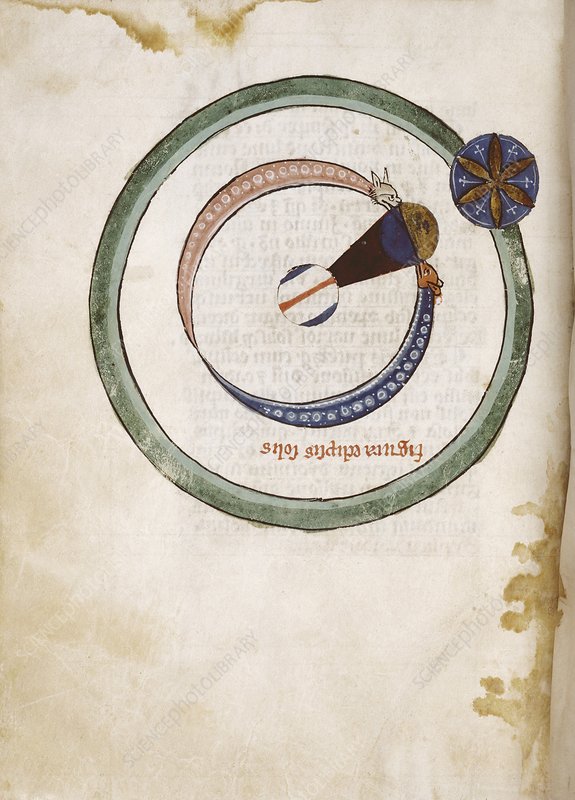
By the time the sun is partially obscured, Mercury himself will be at five degrees of Libra, also in a Saturnian bound. The Lord of Time is retrograde in Pisces, the misty waters of the Cacodaimon. The meaning is sharpened: the messenger bears the eclipse in his earthly house and carries the burden of its release, whilst standing under the Saturnalian discipline. The regency shows that this is not a simple transit of Mercury through Libra, but a season in which the Word itself is tested through eclipse and tribulation.
Libra, as a sign of air, is guarded by the rulers of its triplicity: Saturn in the day, Mercury in the night, and Jupiter as participant. Hermes thus steps into terrain he knows. But the true mistress of the house is Venus and her condition tells us how the guest will fare. She now stands at the twenty-eighth degree of Leo, in the bound of Mars, on the very edge of departure. During Mercury’s ingress, Venus is engaged in her own struggles. She applies to a square with Uranus retrograde in Gemini and holds a separating sextile with Mars still in Libra.
Tomorrow she enters Virgo, her place of fall and, in doing so, she also comes under the command of Mercury, creating a mutual, Hermaphrodite exchange between them that will last until October 7. The dove and the caduceus will carry each other’s keys for a time, although her footing is weak upon that mutable soil.
This reading was made at the very moment Mercury crossed into Libra, with myrrh burning as incense and the words of Galatians 3:23–29 and 4:1–5 proclaimed aloud.
I. North – What Ancient Pledge Must Be Remembered as Mercury Crosses into Libra?
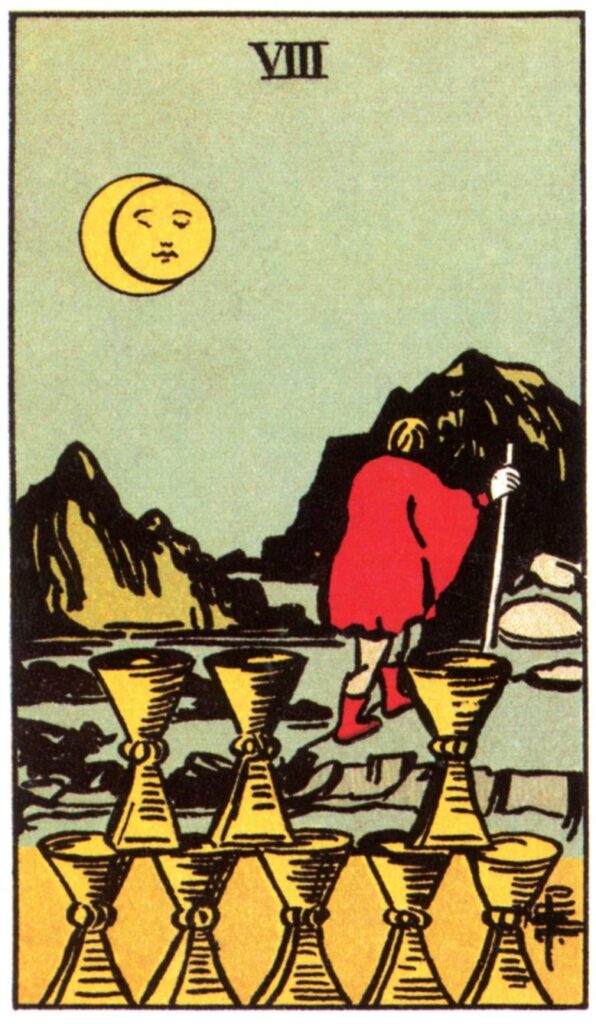
In the North stands the Eight of Cups. This is the sign of Hod in Briah, the mercurial sephira of form and language, clothed in the watery realm of creation. Hod belongs to the pillar of the Mother and the card shows departure from what has been tasted, a leaving behind of lesser vessels to seek the higher chalice.
In the labour of the Spirit this marks the renunciation that is demanded when the Messenger leaves his own exalted place in Virgo. The voice of Raphael, who presides over Hod, carries the healing power of separation. To walk away from the old wineskins is a movement toward the unseen fidelity of the soul. The Eight of Cups is a consecration through withdrawal, a recognition that the Spirit must not cling to what is already exhausted. In this way the roots are cleansed and the foundation is prepared for new articulation.
II. South – What Word or Gesture Must Be Spoken During The Transit?
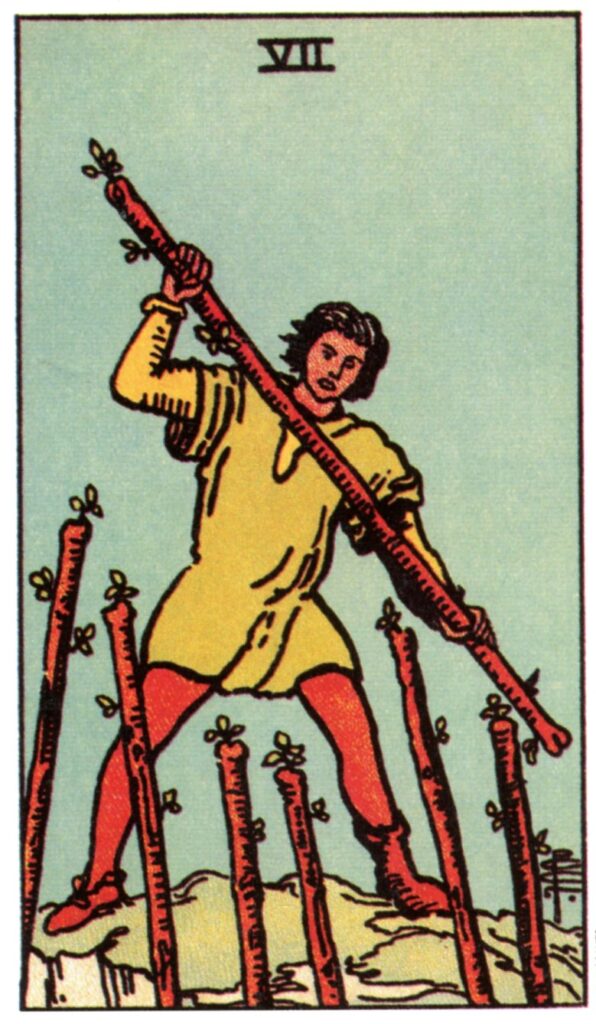
In the South we find the Seven of Wands, the flame of Netzach in Atziluth. Netzach belongs to the column of the Father and, in the primordial world of emanation, it shines as the fierce insistence of ivine will clothed in the figure of Venus. This is the voice of Haniel, the Archangel of beauty and victory, but in a martial key, since the seven wands are a struggle for mastery.
If the Eight of Cups calls for departure, the Seven of Wands demands affirmation, a stance in the midst of trial. The Spirit must not only leave behind the cups of Hod, it must also defend the flame of Netzach against opposition. This is the southern command, the call of the mission in the world. Speech, treaty, and covenant will be pressed, and the Spirit is asked to stand upright and hold fast to the word that is entrusted to it. Thus the Imum Coeli and Medium Coeli in this spread mirror one another: Mercury and Venus, Raphael and Haniel, Hermes and Aphrodite – the intellect of the Mother and the desire of the Father, each demanding its portion of the task.
III. West – How Does the Other Become Part of the Hermetic Labor As The Heavens Demand Balance Between Mercy and Severity?
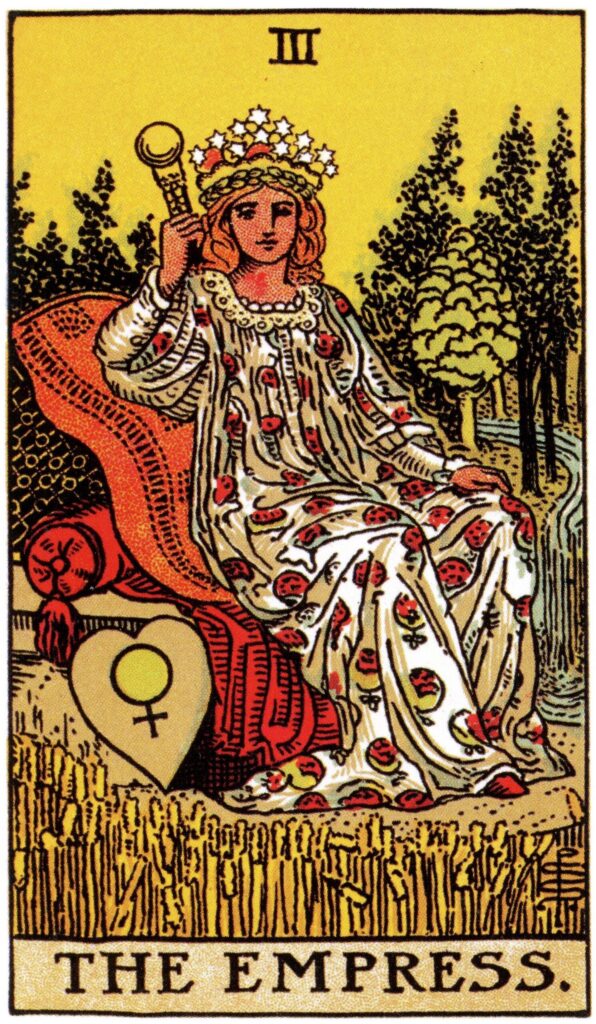
In the West rises the Empress, the third major arcanum, enthroned upon the path Daleth. This is the Door that connects Binah of Archangel Zaphkiel and Chokmah of Archangel Raziel, the Mother and the Father above the abyss. It is the horizontal bridge that unites severity and wisdom, adorned with the Venusian star, the Stella Matutina. The presence of this card at the place of the Descendant speaks directly of the Other, since the Door is always a passage into communion.
To receive the Empress is to recognise that the offering is not solitary, but must pass into reflection and union. The work of the Spirit in this season cannot be enclosed in itself, as it is placed upon the scales with another. The door opens and what is received must be shared, since the mystery of Venus is always relational. This is why the Empress stands as the mirror of the Bride, the figure who unites the two supernal pillars and clothes them in form. In this spread she confirms the dominion of Venus, not as a weak regent, but as the very portal through which the work of Mercury becomes embodied in covenant.
IV. West – What Incarnated Presence Must the Spirit Assume to Cross This Gate Without Losing the Clarity of Its Voice?
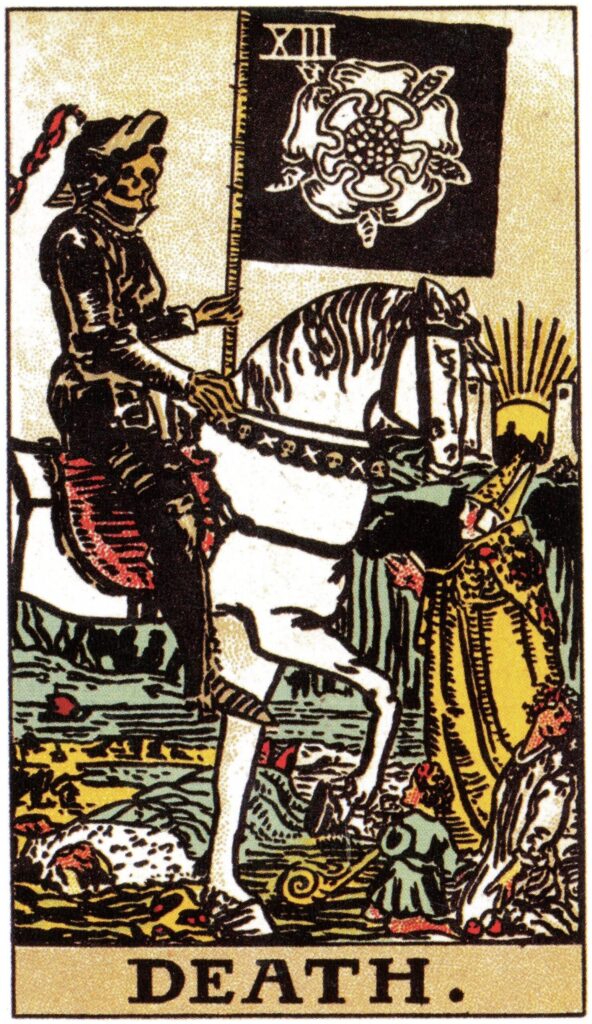
In the East we meet Death, the thirteenth arcanum, the path Nun between Netzach and Tifereth. The fish swims in the waters of Scorpio and the reaper holds his scythe to allow the passage. Death in this position reveals the form the Spirit must take in the body: it is the shape of surrender, the acceptance of transformation, the embrace of decay that leads to renewal. Netzach ascens into Tifereth and the desire of Venus is offered into the heart of the Logos, where Archangel Michael presides with the flaming beauty of equilibrium. This is the silence that prepares resurrection. To walk as Death is to walk as one already given over, emptied for the sake of the Logos that shines beyond. In the eastern place this card is a command to embody the passage, to let the flesh be shaped as a vessel of transmutation, to wear mortality as a sign of fidelity.
The meaning deepens when we recall that Mercury will soon rule a partial solar eclipse in Virgo. Tifereth corresponds to the Sun upon the Tree, and an eclipse, even if partial, always carries the mark of death and the Scorpionic passage into shadow. The arcana therefore intertwine: Death in the body is mirrored by the death of the solar light. The eclipse falls in the anaretic degree of the sixth house, a place the ancients linked with Bad Fortune, where service is tested under toil. To connect this eclipse with the thirteenth arcanum is to see that the Spirit is asked to walk through the eclipse of the Logos itself, to suffer the waning of the light, and to hold faith that resurrection follows the shadow.
When these four pillars are read together the figure emerges with clarity. The Spirit is called to renounce through Hod, to struggle through Netzach, to open through Daleth, and to embody through Nun. The entire spread is woven by the thread of Mercury and Venus. Raphael and Haniel meet as two wings that bear the same flight. The Voice and the Desire must be bound, the Scribe and the Bride must be joined, the Mind and the Beauty must exchange their keys. This is the meaning of Mercury’s entrance into Libra, a passage marked by withdrawal and affirmation, union and eclipsed death.
Κύριε ελέησον
